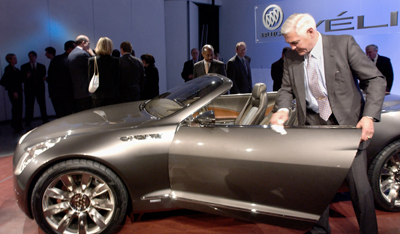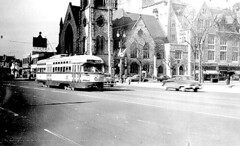More about buses (from Detroit)
Dr. Transit did read this article from Friday's Detroit News "Livonia may opt out of SMART: Cutting bus service would lower taxes, council says; system would lose $2.7 million." According to the article:
"Faced with shrinking revenue and rising costs, the City Council has proposed that the city opt out of the SMART bus system, a move council members say could lower taxes, maintain an alternate transportation system for residents and provide funds for capital improvements.
A pullout by Livonia would siphon $2.7 million from the Suburban Mobility Authority for Regional Transportation coffers and be a blow, transit activists say, to the already fractured bus system many Metro Detroit communities have shunned, citing unreliability and low ridership.
Michael Whims, operations director of Transportation Riders United, a local advocacy group, said cities haven't done enough to promote the service. 'From a regional standpoint, we can't continue to allow communities to opt in and opt out as they have in the past -- it creates holes in the center of our transportation system,' Whims said." Yet, "More residents are riding SMART"
We don't have quite the same problem in the DC, although various counties (Alexandria, Montgomery, Fairfax, Prince Georges) have created primary or supplemental systems that complement the WMATA bus services, which because they are unionized, are more expensive. Inter-county services are still provided primarily by WMATA.
Various systems do create a possible problem of fragmentation, but this is a problem for inter-county transportation more than it would be for intra-county transportation. In any case, fragmentation does create marketing, information, and access issues. Gotta read that Regional Bus Study...
Getting back to Detroit, can you imagine how difficult it is to promote public transportation in that region? as it is home to the hurting but still politically dominant Big Three automobile manufacturers.
 General Motors Vice Chairman Bob Lutz wiping smudges off a concept car at the New York Auto Show in 2004. Lutz previously had high positions at Chrysler and Ford. As a car enthusiast, he is unlikely to be a big booster of expanded public transportation in the Detroit area.
General Motors Vice Chairman Bob Lutz wiping smudges off a concept car at the New York Auto Show in 2004. Lutz previously had high positions at Chrysler and Ford. As a car enthusiast, he is unlikely to be a big booster of expanded public transportation in the Detroit area.Surprisingly enough, the Detroit area had a successful trolley and streetcar system for many years. As companies went under with the rise of the automobile, the Detroit Street Railway, owned by the City of Detroit, ended up buying many of the systems and providing services, even to suburban destinations. This made sense as Detroit was still the primary destination for work and shopping trips. These days, the Detroit area, like DC, has big city vs. suburban political and economic issues, but the Detroit area never developed a regional transportation organization with the same level of depth and breadth of the WMATA system, which has a board comprised of representatives from Virginia, Maryland, and DC.
 (Streetcar on Woodward Avenue. My father's dental office was next to this Church on Grand Circus Park. His office has since been demolished for a parking lot, and the present-day baseball and football stadiums are behind and to the right of the church.)
(Streetcar on Woodward Avenue. My father's dental office was next to this Church on Grand Circus Park. His office has since been demolished for a parking lot, and the present-day baseball and football stadiums are behind and to the right of the church.)Imagine being a transit advocate in the Detroit area--"Mass-transit users are a Motor City minority: Few people give up convenience of a car". Talk about a challenge.
Nonetheless, Transportation Riders United and Motown Tranzit website are trying. They are helped by the Michigan Land Use Institute, which is a best practices example of a local land use advocacy group (I hesitate to use the phrase "smart growth").



0 Comments:
Post a Comment
<< Home